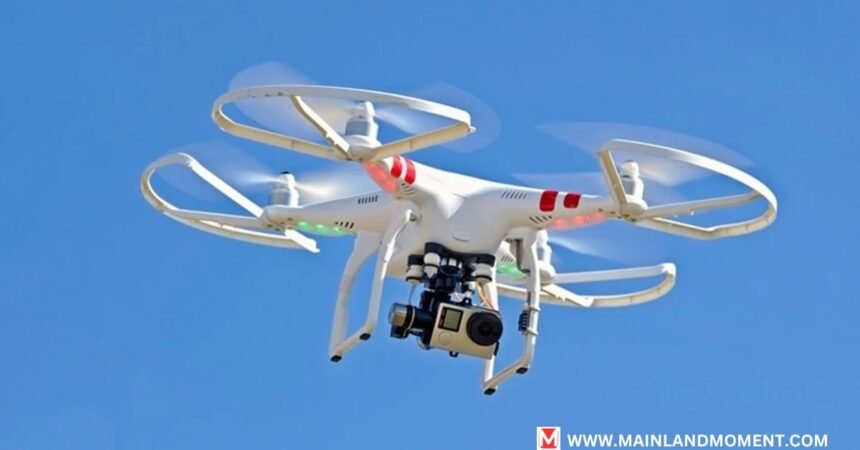Drone Technology Trends Shaping 2025 and Beyond
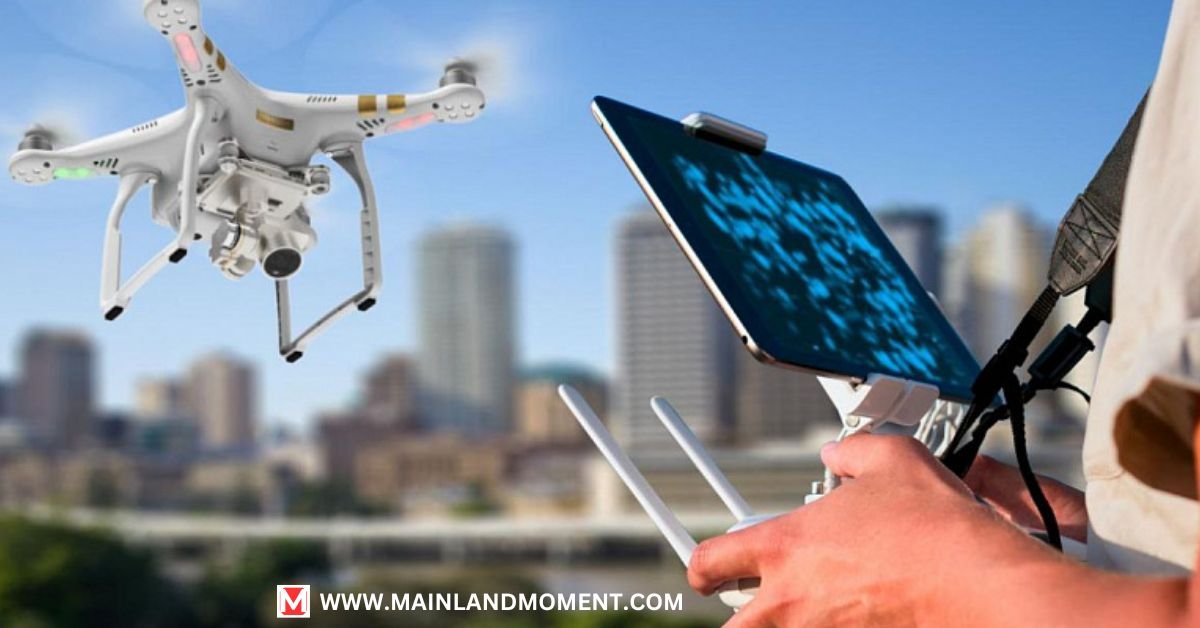
Drones are no longer just buzzing toys for hobbyists. They’ve soared into a $73 billion industry, with experts predicting a 14.3% growth rate through 2030, according to Grand View Research. From delivering packages to fighting wildfires, drone technology is rewriting how we tackle big challenges.
What’s fueling this skyward surge? Cutting-edge innovations that make drones smarter, greener, and more versatile than ever. In this post, you’ll discover the hottest drone advancements shaping our world right now and how they’ll impact your life. Ready to explore the skies? Let’s take off.
Smarter Skies: AI and Machine Learning Powering Drones
Imagine a drone that doesn’t just follow your commands it thinks for itself. That’s where artificial intelligence steps in, turning UAV technology into something straight out of sci-fi. Today’s drones use machine learning to spot objects in real time, dodge obstacles mid-flight, and even predict what’s coming next. Picture a drone weaving through a storm to deliver medicine or scanning a field for crop disease without missing a beat.
How does this work? Deep learning algorithms crunch data from cameras and sensors, letting drones adapt on the fly. For instance, a construction drone might recognize a crane in its path and reroute instantly no human input needed. This intelligent automation slashes errors and ramps up efficiency. Companies like DJI and Skydio are leading the charge, with models like the Skydio 2+ boasting AI that rivals a seasoned pilot.
Why should you care? AI-powered drones unlock complex missions. They’re already inspecting power lines, tracking wildlife, and guiding search-and-rescue teams. The sky’s getting smarter and it is just the beginning.
Hands-Off Flight: The Rise of Autonomous Drones
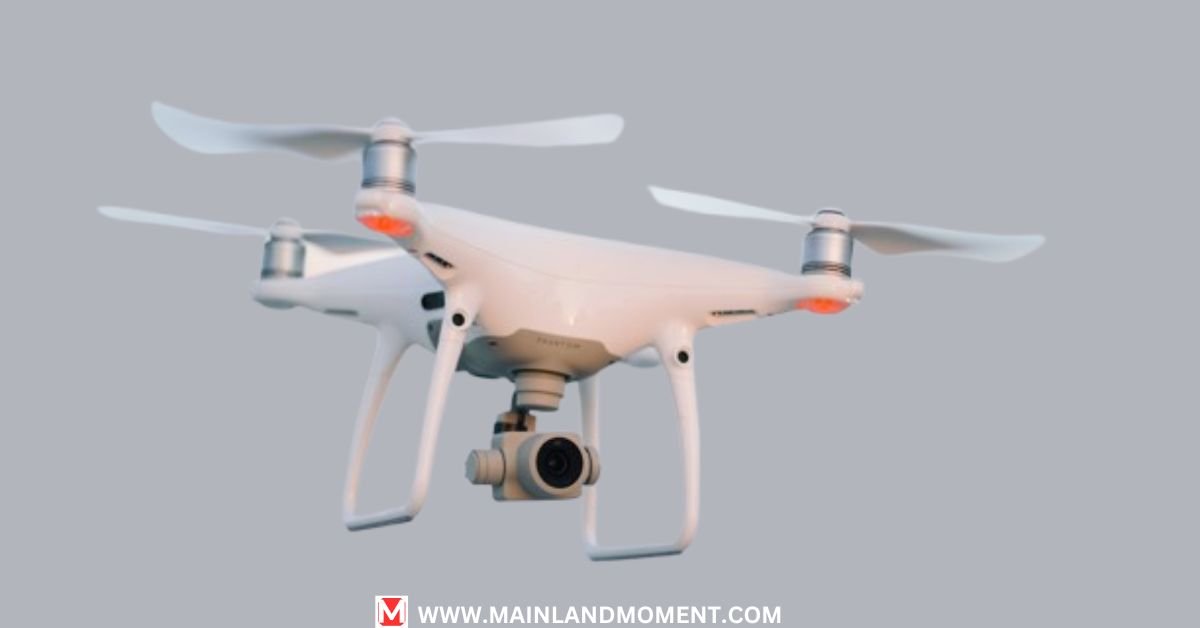
Forget fiddling with a joystick. Autonomous drones are here, and they’re changing the game. These self-flying drones rely on advanced GPS, onboard computers, and AI-driven drones Tech to navigate solo. Some even team up in swarms, working together like a flock of high-tech birds.
Take disaster response as an example. During the 2023 Turkey-Syria earthquake, automated UAVs scanned the rubble for survivors faster than any ground crew could. Swarm tech, tested by firms like Teal Drones, lets dozens of drones map huge areas in minutes. Each unit shares data instantly, creating a live 3D picture of the scene.
What’s driving this? Improved processors and independent drone operations mean less human oversight. The result? Pilotless drones tackle jobs too risky or tedious for people think monitoring oil rigs or delivering aid to war zones. With the FAA easing rules on beyond-visual-line-of-sight (BVLOS) flights, drone innovations like these are ready to soar.
Staying Aloft: Breakthroughs in Battery Life and Power

Range anxiety isn’t just for electric cars drones have faced it too. But not anymore. Advances in drone battery tech are keeping UAVs airborne longer than ever. Modern lithium drone batteries now push flight times past 60 minutes, while some experimental models hit two hours or more.
What’s the secret? High-capacity cells, like those from Amprius Technologies, pack more juice into lighter packages. Solar panels on wings think Sunlight’s HALE drones sip sunlight to stretch range. And hydrogen fuel cells? They’re powering beasts like the HyLight drone, which flew for 10 hours straight in 2024 tests.
For you, this means real-world wins. Farmers can map sprawling fields without recharging. Emergency crews get uninterrupted aerial intel during crises. With long-lasting batteries and rechargeable drone power, the sky’s open for business longer.
Battery Tech Comparison Table

Next-Level Sensors and Cameras
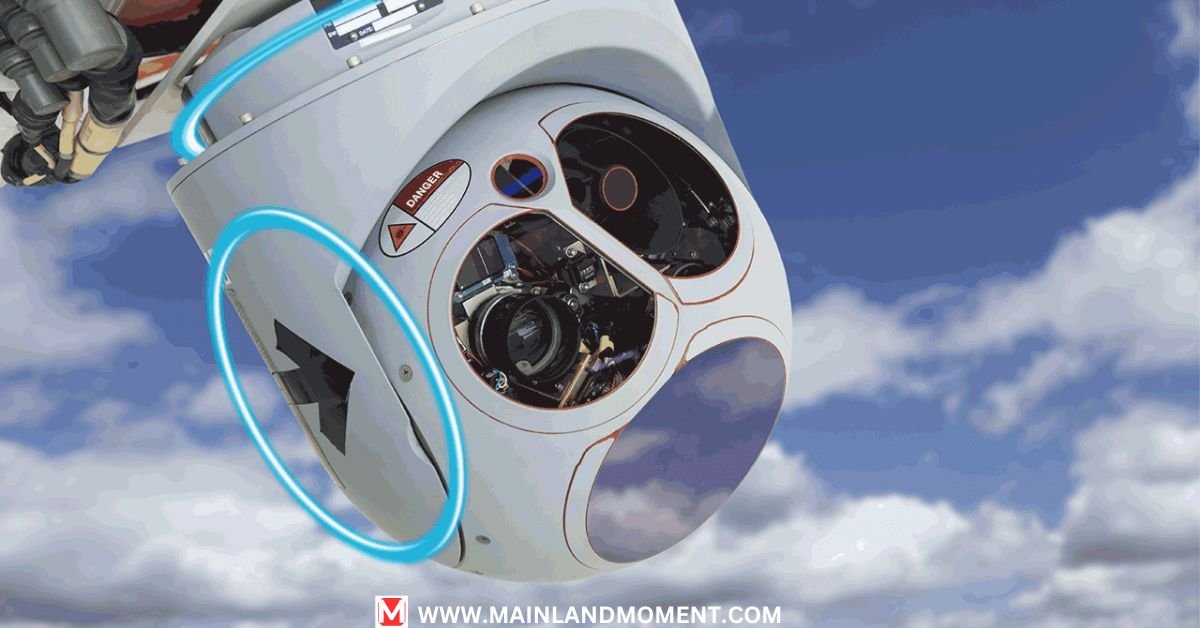
Drones don’t just fly—they see the world in stunning detail. Enhanced sensors and cameras are turning aerial robotics into powerful tools. Today’s drones rock 8K cameras, thermal imaging, and multispectral imaging that reveal what’s invisible to the naked eye.
Construction crews use high-resolution drone cameras to build 3D site models in hours, not days. Ecologists lean on advanced UAV sensors to track endangered species—like the 2024 project mapping sea turtle nests with LiDAR. And aerial surveillance technology? It’s spotting illegal logging in the Amazon with pinpoint accuracy.
Case in point: FLIR’s thermal cameras caught wildfire hotspots in California last year, saving homes before flames spread. These drone advancements aren’t just cool they’re solving problems right now.
Instant Insights: 5G and Real-Time Connectivity
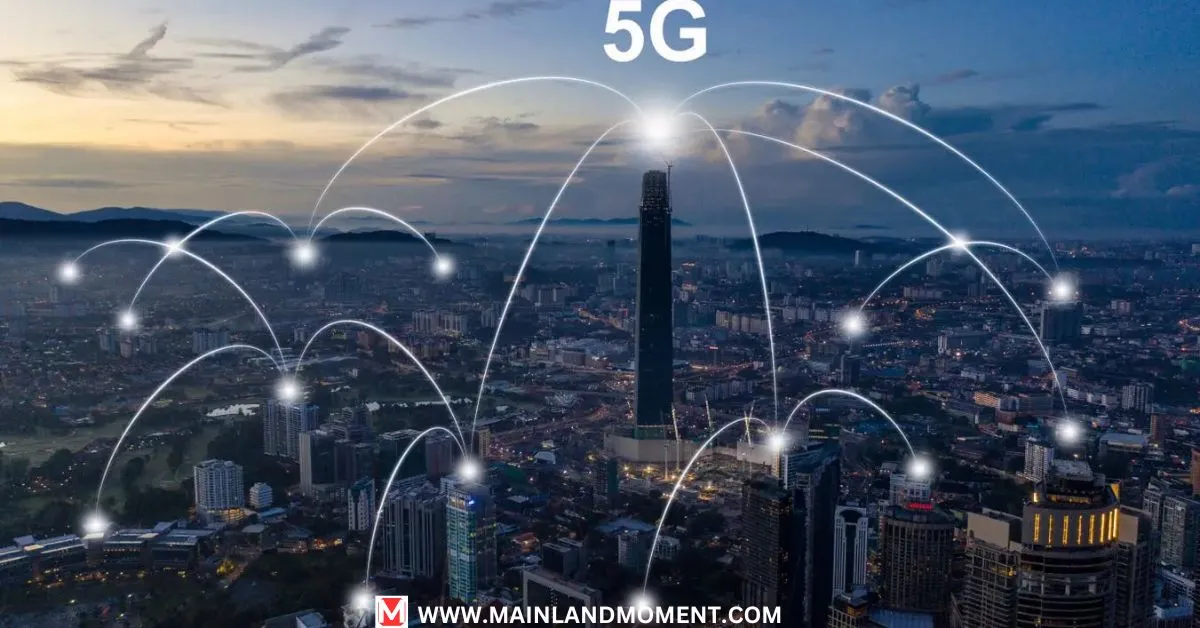
Your phone loves 5G, and drones do too. 5G connectivity is turbocharging drone technology with high-speed networks and low latency communication. What does that mean? Live HD video feeds and real-time data transfer from miles away, no lag.
A 5G-enabled drone hovers over a flood zone, beaming crystal-clear footage to rescue teams instantly. That’s not a dream it happened during Hurricane Helene in 2024, cutting response times by 40%. With bandwidth that handles massive data, drones upload 3D maps or sensor readings on the fly.
Why it’s big: Ultra-fast connectivity ties drones to cloud-based analytics, making them smarter and faster. Logistics firms like UPS are testing IoT-enabled drones for next-day delivery, all thanks to 5G’s magic.
Green Wings: Eco-Friendly Drone Innovations
Drones are shedding their noisy, gas-guzzling past. Eco-friendly drones are taking flight, powered by green drone technology that’s kinder to the planet. Electric motors hum quietly, cutting noise pollution. Solar-powered drones sip sunlight for extra range think Zephyr’s record-breaking 25-day flight.
Even cooler? Some frames now use biodegradable materials. Hylio’s 2024 prototype melts away harmlessly after its lifespan, leaving no waste. These sustainable UAVs shine in conservation tracking poachers or planting trees without harming the environment they protect.
“Drones can be heroes, not villains, in the fight for sustainability,” says Dr. Maria Lopez, an environmental tech researcher at MIT. With electric drones leading the charge, the future’s looking greener.
Workflow Wizards: Seamless Integration with Everyday Tools
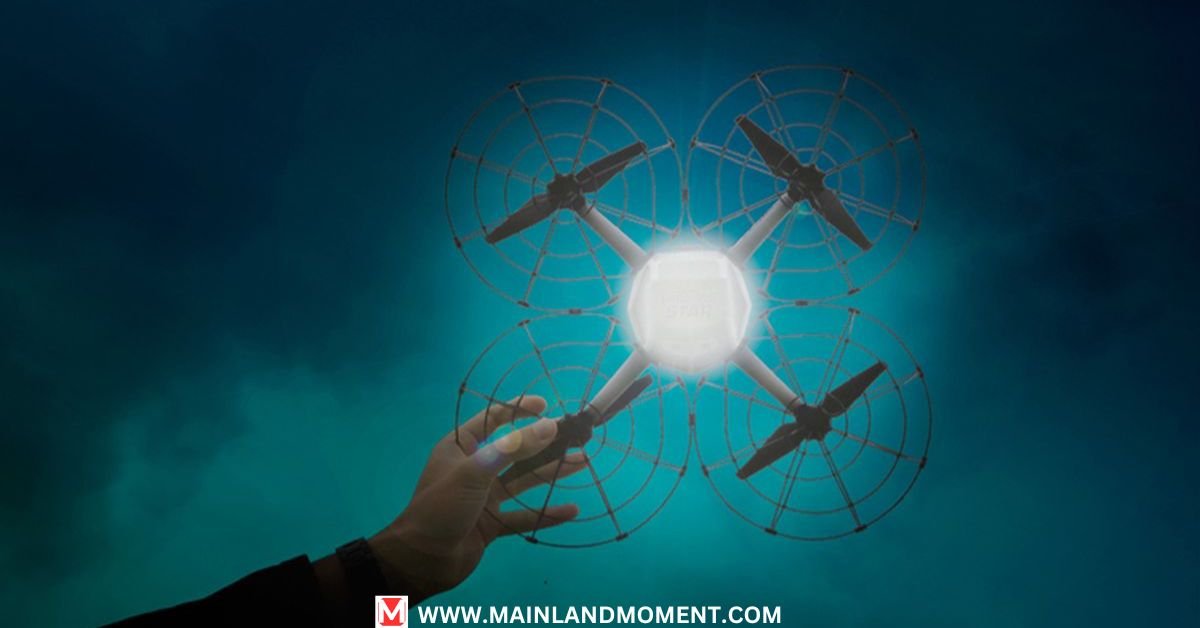
What if drones slipped into your daily grind like a trusted coworker? Cloud integration and smart software are making it happen. Modern drone innovations stitch aerial data into tools you already use no clunky workarounds.
A drone with Pix4D software snaps photos, then spits out a 3D model straight into CAD no manual uploads. Remote data access means architects tweak designs from anywhere. And real-time cloud computing? It’s feeding drone stats into project dashboards instantly.
For example, John Deere’s drone deployment syncs crop health data with farm management apps, helping growers act fast. This isn’t futuristic it’s streamlining workflows today.
From Farms to Frontlines: Drone Applications Exploding
Drones aren’t picky about where they work they are everywhere. Drone applications are popping up in wild ways, solving problems across industries. Let’s break it down:
- Precision Agriculture: Agricultural UAVs spray crops with laser accuracy, saving 30% on water versus traditional methods, per USDA stats.
- Logistics: Amazon’s Prime Air aims for 30-minute deliveries commercial drone use at its finest.
- Public Safety: Emergency response drones like DJI’s Matrice 300 spot wildfire hotspots or lost hikers with thermal imaging.
- Entertainment: Drone light shows dazzled 2024’s Super Bowl, replacing fireworks with aerial applications.
Why now? UAV use cases are maturing as tech catches up with demand. From smart farming to industry drone solutions, drones are rewriting the playbook.
Top Drone Use Cases in 2025
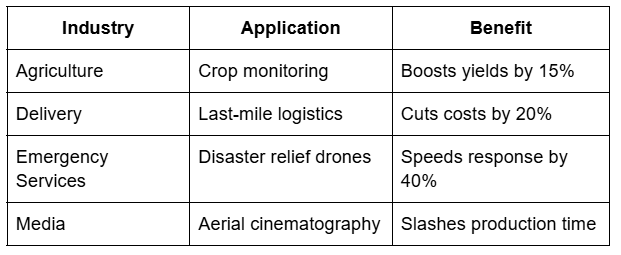
The Challenges Ahead: What’s Holding Drones Back?
Progress is not perfect drones face headwinds. Regulations still tangle autonomous drones, especially for BVLOS flights. The FAA’s loosening up, but rules lag behind tech. Cybersecurity’s another beast. 5G connectivity opens doors to hackers imagine a hijacked drone dropping packages in the wrong hands.
A tricked-out drone with enhanced sensors and cameras can run $20,000 or more, per Drone Industry Insights. Small businesses might balk at that price tag. However, solutions are bubbling up. AI-driven air traffic systems could untangle skies, and cheaper high-capacity drone batteries are hitting the market.
FAQs About Drone Technology Trends
How Does Artificial Intelligence Make Drones Smarter?
Artificial intelligence powers AI-driven drones with computer vision and neural networks. They spot obstacles, recognize patterns (like a lost hiker’s heat signature), and adjust flight paths instantly. Think of it as giving drones a brain to handle tough jobs solo.
Are Autonomous Drones Safe to Use?
Yes, but with caveats. Self-flying drones use redundant systems GPS, sensors, and backups to avoid crashes. Still, cybersecurity risks linger. Experts say pairing independent drone operations with strict oversight keeps them reliable for tasks like disaster relief drones.
What’s the Deal with Drone Battery Life Now?
Drone batteries are leaps ahead. Lithium drone batteries hit 60–90 minutes, while solar-powered drones and hydrogen cells stretch to hours. Amprius’s 2024 cells, for example, pack 500 Wh/kg double the energy of older models.
How Are Drones Helping the Environment?
Eco-friendly drones cut noise with electric motors and use biodegradable drones materials. They shine in smart farming reducing pesticide runoff or conservation, like reseeding forests. Zephyr’s 25-day solar flight proves green tech works.
Can Drones Really Replace Jobs?
Not quite. Drone applications boost efficiency, not unemployment. In precision agriculture, they save farmers time on crop checks. In logistics, 5G-enabled drones speed deliveries but still need humans for strategy. They’re tools, not takeovers.
Conclusion
Drone technology isn’t waiting for tomorrow it is reshaping today. From AI-powered smarts to eco-friendly drones, these trends are landing in farms, cities, and disaster zones right now. Whether you’re a farmer eyeing precision agriculture, a filmmaker chasing epic shots, or a first responder needing emergency response drones, there’s a UAV for you.
So, what’s your move? The sky’s not the limit it the starting line. Jump in, explore, and ride the drone advancements wave. The future’s overhead, and it’s buzzing with possibility.

